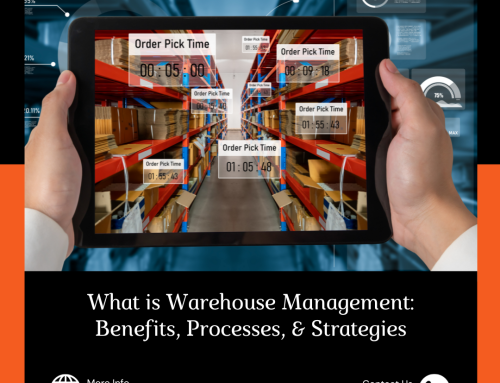Efficient warehouse management is a critical factor for businesses that handle inventory management. It involves overseeing the storage, movement, and tracking of goods in a warehouse. The optimization of warehouse management can help companies improve their supply chain, customer satisfaction, and reduce costs.
Share This Story, Choose Your Platform!
In this blog post, we’ll discuss the importance of efficient warehouse management and how it can benefit your business.
The Benefits of Efficient Warehouse Management
Optimized Inventory Management
Efficient warehouse management guarantees that goods are stored in the right location, making it easy to locate them when needed. This reduces the time spent searching for items, increasing productivity and efficiency. By using barcoding and RFID technology, businesses can track the movement of goods in real-time, ensuring that inventory levels are accurate and up-to-date. This means that businesses can avoid the costs associated with inventory stock-outs or overstocking, which can be costly to businesses. By managing inventory levels effectively, businesses can improve their bottom line, reduce storage costs, and improve their overall operations.
Improved Order Fulfillment
Efficient warehouse management improves order fulfillment by streamlining the process and reducing order processing times. Accurate inventory tracking and efficient order picking processes can help reduce errors and ensure that orders are shipped out on time, improving customer satisfaction and increasing sales. By investing in efficient warehouse management, businesses can streamline their order fulfillment process, avoid costly mistakes, and enhance their customer satisfaction levels.
Prevention of Stock-Outs and Overstocking
Efficient warehouse management helps prevent stock-outs and overstocking, both of which can be costly to businesses. Stock-outs can result in lost sales and dissatisfied customers, while overstocking ties up valuable capital and storage space. By monitoring inventory levels and implementing effective replenishment strategies, businesses can maintain optimal inventory levels and reduce the risk of stock-outs and overstocking. This means that businesses can avoid the costs associated with lost sales and improve their overall operational efficiency.
Reduced Operating Costs
Efficient warehouse management can help businesses reduce operating costs. By optimizing warehouse layouts and implementing automation technologies, businesses can reduce labor costs and improve efficiency. Additionally, optimizing storage space and reducing waste can reduce overall operating costs. By investing in efficient warehouse management, businesses can reduce their operational costs and improve their bottom line.
Improved Supply Chain Management
Effective warehouse management plays a crucial role in supply chain management. By managing inbound and outbound logistics effectively, businesses can ensure that goods are delivered on time and at the right location, reducing transportation costs and improving customer satisfaction. By investing in efficient warehouse management, businesses can optimize their supply chain operations and gain a competitive advantage.
Implementing Efficient Warehouse Management
To achieve efficient warehouse management, businesses need to implement effective processes and technologies. This includes implementing an inventory management system, using barcoding and RFID technology, optimizing warehouse layouts, and training employees on efficient picking and packing techniques. By investing in these strategies, businesses can optimize their warehouse operations and improve their bottom line.
Inventory Management System
An inventory management system is essential for efficient warehouse management. It provides businesses with real-time inventory data, allowing them to track inventory levels and optimize their inventory storage. By using an inventory management system, businesses can avoid stock-outs and overstocking, reduce inventory holding costs, and improve their order fulfillment process.
Barcoding and RFID Technology
Barcoding and RFID technology can help businesses streamline their warehouse operations and improve inventory accuracy. By using barcoding or RFID tags, businesses can track the movement of goods in real-time, reducing the time and effort required to locate items. This technology can also help reduce errors and increase productivity, as employees can quickly and easily identify the correct items to pick and pack. By investing in barcoding and RFID technology, businesses can reduce the time and costs associated with manual inventory tracking, and improve their order fulfillment process.
Optimizing Warehouse Layouts
Optimizing warehouse layouts can help businesses improve their operational efficiency and reduce costs. By designing the warehouse layout in a way that reduces the distance between inventory storage and picking areas, businesses can reduce the time it takes to pick and pack items, increasing productivity and reducing labor costs. Additionally, businesses can use vertical space by implementing tall storage racks, allowing them to store more inventory in a smaller footprint. By optimizing warehouse layouts, businesses can improve their inventory storage capacity, reduce labor costs, and improve overall operational efficiency.
Training Employees
Training employees on efficient picking and packing techniques is essential for efficient warehouse management. By providing employees with the necessary training and tools, businesses can reduce errors, improve productivity, and increase employee satisfaction. Proper training can help employees understand the importance of accurate inventory tracking, efficient picking and packing techniques, and the use of technology to streamline warehouse operations. By investing in employee training, businesses can improve their bottom line, reduce costs, and improve overall operational efficiency.
Conclusion
Efficient warehouse management is essential for businesses that handle inventory management. By optimizing warehouse operations, businesses can improve their supply chain, customer satisfaction, and reduce costs. The benefits of efficient warehouse management include optimized inventory management, improved order fulfillment, prevention of stock-outs and overstocking, reduced operating costs, and improved supply chain management. To achieve efficient warehouse management, businesses need to implement effective processes and technologies such as an inventory management system, barcoding and RFID technology, optimizing warehouse layouts, and training employees. By investing in these strategies, businesses can optimize their warehouse operations, improve their bottom line, and gain a competitive advantage.
Improve your supply chain and customer satisfaction with efficient warehouse management by Purple Cow! We optimize inventory management, streamline order fulfillment, and reduce operating costs. With barcoding and RFID technology, inventory tracking and accuracy are improved. Optimizing warehouse layouts and employee training can also help increase productivity and reduce labor costs. Invest in efficient warehouse management to gain a competitive advantage and improve your bottom line.
Share This Story, Choose Your Platform!
In This Blog:

















